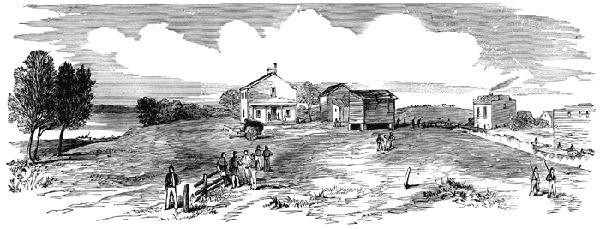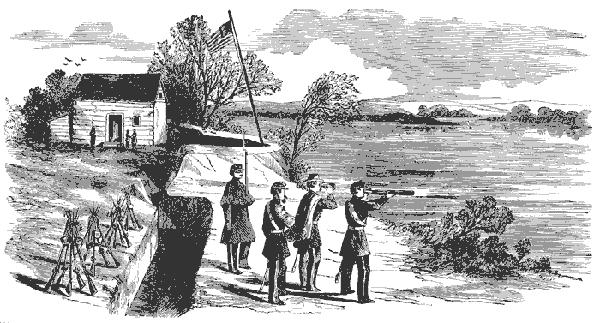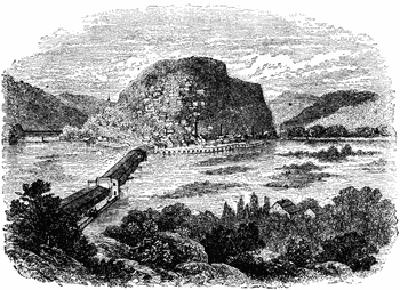The David Whitney Story
Part II – Chapter 1
Alonzo B. Whitney and Alpheus Cheneywith the 10th Vermont Regiment
Line of Defense along the Potomac
Daniel and Julia Hall Whitney's oldest son, Alonzo B. Whitney, volunteered in the first call for troops in Vermont. He and a future brother-in-law, Alpheus Cheney, enlisted in Brookfield in August 1862 and went on active duty with Company G of the 10th Vermont Infantry Regiment in September of that year. They were sent immediately to the Washington, DC, area and took part in the Union defense of the nation's capital in lines westward from Washington along the Maryland side of the Potomac river.

Image from FCIT Clipart Collection.
Edward's Ferry, West Flank of Potomac Defense Line, 1862
The Coolidge School and Letters to the Coolidge Family
In the year just before the war, these two young men from Brookfield had taught at the Coolidge family school in Plymouth, Vermont. During an early encampment along the Potomac, where their regiment was performing guard duty about 20 miles up from Washington, the young recruits wrote letters to the Coolidges, expressing their feelings about their service and describing conditions in their camp. Both emphasized the prevalence of disease among the troops.
Alonzo's Letter
In a letter dated October 15, 1862, Alonzo wrote that although he had not been off duty due to sickness since he had enlisted—despite having to sleep on the ground in open air through dew and rain—his company had at least 20 to 25 soldiers unfit for duty. This was not as bad as in some of the other companies, including a death each of the two previous nights.
Because of the lack of medical provisions, Alonzo was pressed into caring for the sick in his company, remarking to Mrs. Coolidge that he might have "to take up with the advice you gave me last winter which was to study medicine and become a Physician as I have got to be a nurse and perhaps by the close of the war shall need but little study in order to be ready to practice."
Cheney's Letter
In a letter two weeks later, Cheney noted that both he and Alonzo had become sick in the interim. Cheney had gotten wet one night crossing the Potomac and caught a very bad cold. He had gone to sleep in his wet clothes and woke up "to all appearances about 40 years older than at night." Cheney took cold again the next night by getting wet once more and consequently suffered severe, feverish chills, without, however, becoming delerious. He broke out in a "very hard sweat" and then improved greatly. He managed to stay away from official medical treatment through the care of friends in his company.
Cheney also noted that Alonzo was now sick, though on the mend and out of danger. Three men had died in other companies in the past 10 hours, and another would probably not live till morning. But such deaths had not yet struck Company G.
Alonzo's Sense of Patriotic Duty
In his letter to the Coolidges, Alonzo Whitney spoke of a sense of patriotic duty that had moved him to enlist when the call for troops went out in Vermont. He had done so willingly, leaving behind friends and family with few men to till the fields back home. He also noted that he would lay down his life and believed most others in his unit and many other units would do the same, "if by so doing, peace could be restored in this land." Alonzo thus spoke prophetically.
Company G had not engaged in battle in the period prior to the October 1862 letters, but Cheney had seen armed Confederates on the other side of the Potomac and was prepared to fire back if they had fired on him.
Watch toward the Monocacy
In December of that year, the 10th Vermont Regiment moved their headquarters further north in Montgomery County, Maryland, to Poolesville, from where the various companies were sent to guard strategic sites along the Potomac. Company G, along with two other companies, were stationed overlooking the Potomac at Conrad's Ferry; the other 10th Regiment companies were at White's Ford and at the mouth of the Monocacy river where it enters the Potomac.

Image from FCIT Clipart Collection.
Conrad's Ferry, on the Maryland side of the Potomac
In these positions, along with other Union units in the general area, the 10th served rather light duty, experiencing only false alarms without engaging Confederate troops.
This was not the 10th's only acquaintance with the Monocacy. A little further north on this Potomac tributary, the 10th contributed twice in the defense of an important position close to Washington. In July 1863, the 10th Regiment guarded an important railroad bridge over the Monocacy during the battle at Gettysburg, Pennsylvania. And again, a year later, the 10th Vermont was instrumental to the success of "The Battle that Saved Washington". By that time, July 9, 1864, both Alonzo Whitney and Alpheus Cheney had become officers transferred out of the ranks of Vermont volunteers. However, David Whitney had in the meantime joined the 10th Vermont Regiment and was a part of the later, very significant, Battle of the Monocacy.
Supporting the Battle at Gettysburg from Frederick County, Maryland
On June 24, 1863, just before the decisive battle at Gettysburg, Pennsylvania, the 10th Vermont Infantry Regiment was moved up the Potomac to Harper's Ferry, West Virginia, where it became a part of the Army of the Potomac for the rest of the war.

Image from FCIT Clipart Collection.
Harper's Ferry, on the Potomac
On June 30th, in the build-up to battle at Gettysburg, the 10th was dispatched to Frederick, Maryland, south of Gettysburg. It moved again on July 2nd to a position southeast of Frederick to defend the strategically important Monocacy River railroad bridge from possible Confederate use or abuse. On July 6th, following the Union victory at Gettysburg, the 10th joined the Army of the Potomac in its pursuit of retreating Confederate forces into Virgina.

Image from FCIT Clipart Collection.
Union Forces in Post-Gettysburg Pursuit of Confederates on Emmitsburg Pike
Moving On
The 10th Vermont Regiment was subsequently engaged in many of the fierce battles in Virgina, including the very final ones around Petersburg leading to the Confederate surrender at Appomattox in April of 1865. However, neither Alonzo Whitney nor Alpheus Cheney completed their service with this unit.
©2007 by Thomas Lee Eichman. All rights reserved.